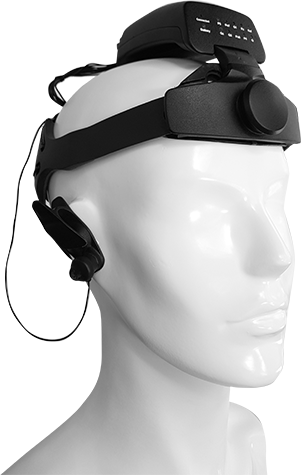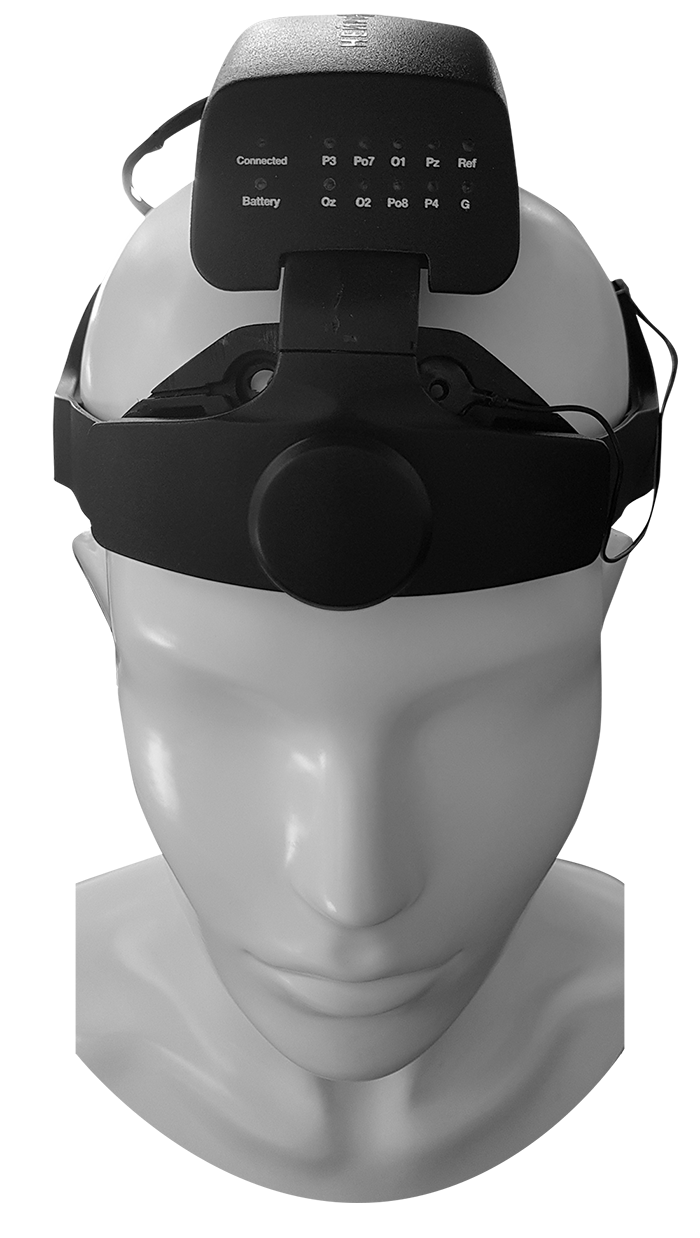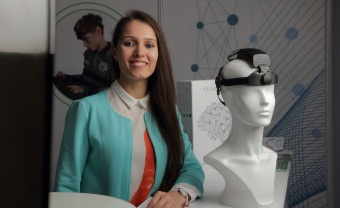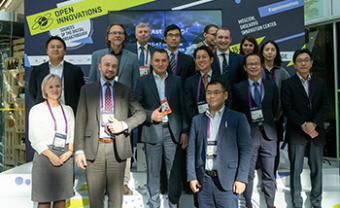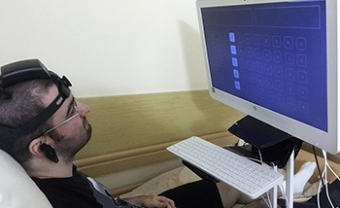
It is not easy for high-tech startups to attract investments at the initial stage, and some of them never reach the final product development. Part of this task is planned to be solved within the framework of the updated national project "Small and medium-sized entrepreneurship and support for individual entrepreneurial initiative", including by increasing the number of residents of technoparks and preferential financing. Natalia Galkina, General Director of the NeuroChat project, told the portal "The Future of Russia. National projects", how she was able to launch a product that allows people with disabilities to communicate on an equal footing, where the future of neurotechnologies lies and why one should not be afraid to create a market from scratch.
From finance to neuromarketing
Natalia was interested in neurophysiology from an early age. Her mother was a doctor and instilled in her an interest in studying the work of the human body. Galkina received her first education at Lomonosov Moscow State University with a degree in neurophysiology. However, the chosen profession at that time did not promise earnings.
"After graduating from the biology faculty of Moscow State University, I stayed to work at the department, but perestroika found me with my husband, who was also a researcher, with a small child, so I had to look for new ways and some additional earnings. Due to the changes taking place in the country, it was necessary to master new types of activities. I became interested in how accounting works, how finance works," she recalls.
Having moved from strict economics to PR of financial structures, in 2004 Natalia decided to switch to consulting and auditing.
But the dream of doing neurophysiology was not abandoned. Already in 2011, Natalia, having learned about the purchase of the first private neuromarketing firm NeuroFocus by a large research company Nielsen, realized with her colleagues that studying the emotional and behavioral reactions of consumers would change the approach to marketing research.
"It became obvious that it was necessary to create a Russian local company that would use the achievements of neuroscience in economics and marketing. <...> When the project was invented, we thought it would be great to develop it in Skolkovo," the entrepreneur recalls. — Significant financial investments were required. Then we were supported by several private investors, who are still shareholders of the company today."
An important stage in the development of the project was the purchase of equipment. Taking into account its search, the formation of the laboratory continued for more than two years.
"In 2014, we implemented this plan — we assembled the first neuromarketing laboratory, which had advanced equipment from different manufacturing countries," says Natalia.
According to the founder of the project, another serious difficulty was the need for switching — bringing equipment from different manufacturers into a single system for coordinated work.
"Nevertheless, this laboratory has started working, and we have started to carry out the first commercial projects. And it became clear that by entering the market with this, we are still overcoming various fears. Firstly, the very word "neuromarketing" is very "tasty" today. At some point, the prefix "neuro" became like the prefix "nano" — there was a lot of foam, and everyone called "neuro"!" the entrepreneur recalls.
Over time, due to the growth in the number of commercial orders, the project turned into the largest neuromarketing research company in the CIS.
The dream of making the world a better place
In 2016, a good friend of Natalia, Professor, Doctor of Biological Sciences Alexander Kaplan, in his laboratory of neurocomputer interfaces at Moscow State University, developed a brain—computer communication technology that allows you to determine a certain pattern in the human brain and, based on it, transmit a command to an external device, including a computer.
"Probably, we are still dreamers. We really wanted to make the world a better place. We saw a huge potential in this technology and set the task of scientific development and laboratory layout not only to make a consumer—class product, but also to create a new communication service - to make possible neurocommunication not only in laboratory conditions, but also in real life. After all, this is a real transfer of science into a product solution for people," says Natalia.
That's how the NeuroChat project arose — a completely new product, for which there was no market in Russia yet. This caused difficulties in finding investors.
"Naturally, we tried to go to various institutional venture funds with this. And faced with the fact that they can not evaluate the market. Because even now the market is just emerging, and then it was very difficult to make such an assessment. The situation was saved by the investors with whom we developed the Neurotrend project together — they already understood the potential of neurotechnologies and decided to enter into a new project. In addition, at that time, a window of opportunity opened for the National Technology Initiative (NTI, an association of business representatives and expert communities for the development of promising technology markets and industries in Russia. — Editor's note), and we became one of her projects," says Natalia.
She notes that it is quite difficult to find financing for high-tech projects in general in Russia. If you manage to get funds to create a product, there may not be enough money for its implementation.
"Russians are more inventors, not innovators, because invention is a path from zero to one, innovation is a path from one to hundreds of thousands, to a million. In order to introduce such high—tech products widely, we need resources - both financial, human, and production. As a result, it will still be all about finances. There should be financial mechanisms and systems for assessing how difficult it is and how to implement it. Russian investors are not ready to invest in the project, because it is very risky — there is no way to assess the market. In addition, angel investments for high-tech equipment (investments at the earliest stages of the project. — Editor's note) are needed in significantly larger sizes than what investors are ready for," Natalia explains.
This was followed by a number of examinations: the expert council of the NTI, Skolkovo.
"A lot of people evaluated this project in order to decide whether the state is ready to invest in such a project. As a result, according to the documents, the ratio was approximately the following: 70% of public investments, 30% — private. But in fact, about 50/50, because there turned out to be a lot of work that was not included in the project, but which we had to do. But this project, in principle, arose due to the fact that the state decided to invest in it," Natalia says.
According to the entrepreneur, most of all she was afraid that after all the examinations the project would not be given funding, but the belief in the importance of what the team was doing outweighed the fear. About 193 million rubles were spent on the development and implementation of the project.
"Without the help of the state, such a high-tech project would be extremely difficult to implement. Plus, NeuroChat has more social significance than rapid market growth. This is a very kind project that we created for ordinary people," Natalia emphasizes.
From project to product
If the basic technology of the future "NeuroChat" was developed by Alexander Kaplan, then the whole team is already a product — a neural headset, software and a number of additional services, including a technical patronage service for users. Together with scientists from Kaplan's laboratory, she numbered about 30 people.
"There were moments when we gave up. When there was not enough funding, when faced with various difficulties in the development of a social product, because it is a new product for a new market. So we had to and continue to form this new market. You understand that the product is needed, it is high-tech and progressive, but you can't give it to someone who needs it, because you can't find investments for its implementation and development. And here it is insanely difficult not to lose faith in yourself, your team and in what you have done. It's always difficult to be a pioneer," Natalia recalls.
The promotion of the product — a special headset in the form of a helmet — was partly helped by the fact that its work was demonstrated to Russian President Vladimir Putin in 2017 at the exhibition "Russia looking to the Future". Then the project was widely talked about. However, another problem has arisen — the invention is not medical equipment, and medical institutions cannot buy it. She had to test the product at her own expense.
"Since we have created a fairly large experimental batch within the framework of the project, we were able to try it out, distribute it to users and collect the statistics that are needed now. And now it's just starting to give results — the same medical institutions are filing patents for rehabilitation techniques using "NeuroChat". And this will make it possible to use this equipment and technology more widely," Natalia explains and adds that negotiations are currently underway with the Moscow authorities on wider implementation and testing of the product in medical institutions of the capital.
The technology works as follows: a special helmet is put on the user's head. It registers an electroencephalogram of the brain and transmits the data to a computer or tablet via Wi-Fi. The user "clicks" on the symbols he needs on the computer screen with the power of thought — focusing on the right keys.
The correspondent of the portal Violetta Khaneneva tested the operation of the device on herself. However, she failed to print something to communicate online with other users of the system. But, as the practice of working with the "NeuroChat" shows, learning and developing the skill of typing with the power of thought occurs in the first five classes, so that, like any other skill, you can learn how to work with the device.
"The equipment itself is quite comfortable, despite the fact that special sensors, similar to suction cups, fit quite tightly to the head. There was no unpleasant sensation or pressure. After the helmet was pulled according to the size of my head, calibration took about 15 minutes — this is what the process of attuning the user with the equipment is called. It is necessary to focus your thoughts on those symbols that light up in red, and mentally, as it were, shout some word in order to produce a mental response. For example, "click" — this is how the system captures what you want to print. I was told that for some such attunement does not happen the first time — sometimes it takes up to five attempts to start typing. They explained to me that it was related to concentration," she says.
In February 2018, the first communication of NeuroChat users located in different cities — Moscow and Los Angeles - took place. Now users from different cities and countries can communicate with each other in a special chat. According to Natalia, not all users can use the technology — with some pathologies or injuries it will be impossible.
"It's not a magic wand. This is one of the technologies that can help. There are a huge number of electromagnetic waves around us, and it is very important that we really isolate and record the most useful signal. So that it was a signal from the brain, and not some kind of tip. To do this, of course, there is a whole system of processing this primary signal to make sure that this is a signal from the human brain and the signal that we emit is really a reaction of the human brain, and not a random "noise," she explains.
From offline to online
Initially, the project was designed to help stroke survivors who have received various traumatic brain injuries, special children. Natalia emphasizes: the idea was to focus their efforts on working with those who "can't" without this device.
"We communicate easily with the help of speech, write perfectly, type, we have no such motivation to use "NeuroChat". And if people have no other way to communicate, the motivation is very high. Therefore, they often manage to work even better with our equipment. Over time, the technology will evolve, the speed will increase, and such equipment will become another communication channel that will go directly from the brain to the computer. And, therefore, in the future it can be used in what is today called "human-machine interaction," explains Natalia.
At the same time, the company was looking for ways to expand the market — people for whom the technology would be really useful. This prompted the team to interact with the Moscow Longevity project, which was created on the initiative of the mayor of the capital Sergei Sobyanin in 2018 in order to help the older generation lead an active and healthy lifestyle. Restricting the movement of elderly people makes the "NeuroChat" especially relevant for the older generation: in just a few months of working with the device, some users began to observe positive dynamics.
"For example, Kirill Vasiliev — he has multiple sclerosis, and thanks to classes at NeuroChat, he has a pronounced rehabilitation effect: his cognitive state improves, his handwriting changes for the better. Or Valentina Serdyuk — she has multiple sclerosis, and also had a stroke, and thanks to the "NeuroChat" she began to walk and talk better," Natalia says.
The coronavirus pandemic and the restrictions imposed because of it became a test for the project - the team had to be reduced to ten people. But this time allowed us to focus on the development of a new direction — cognitive training for healthy people.
"Quarantine is not an eternal thing, life will continue. And for us it was just an active search for other tools during this period, including this format of mixed cognitive trainings online — offline: it can work today regardless of the introduction or non-introduction of quarantine. The experience of working with Moscow Longevity has convinced us that it is necessary and that it is interesting," Galkina sums up.
Authors: Violetta Hanineva, Yulia Ermilova.
Source: National Projects: the Future of Russia
